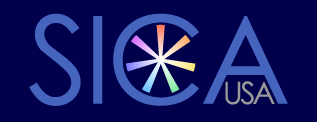Theme for the Eulipions
Written by Rahsaan Roland Kirk and accompanied by Gil Evans on piano
By Daniela Moneta
Rahsaan Roland Kirk plays the piece above that he wrote in 1976 for his album The Return of the 5000 lb. Man, a Warner Bros. recording. The word, Eulipion, refers to what Kirk called, “Agents of Change” – poets, painters, musicians, writers, and artists who changed the world. In this performance, he plays with one hand after a paralyzing stroke in 1975, along with Gil Evans and his orchestra on 30 October 1976 in Westfalenhalle, Dortmund, Germany. He passed away about a year later from complications of his stroke. He was age 41 when he died.
 Rahsaan Roland Kirk was blinded by accident when he was two years old. He mastered by 1963 the art of circular breathing, a technique that enabled him to breath in and breath out at the same time, playing without pause for breath. He was an American jazz multiinstrumentalist, who played tenor saxophone, flute, and many other instruments he invented; including whistles, bells, and recorded sounds. “He was renowned for his onstage vitality, during which virtuoso improvisation was accompanied by comic banter, political ranting, and mostly the ability to play several instruments simultaneously.” From Google Arts & Culture.
Rahsaan Roland Kirk was blinded by accident when he was two years old. He mastered by 1963 the art of circular breathing, a technique that enabled him to breath in and breath out at the same time, playing without pause for breath. He was an American jazz multiinstrumentalist, who played tenor saxophone, flute, and many other instruments he invented; including whistles, bells, and recorded sounds. “He was renowned for his onstage vitality, during which virtuoso improvisation was accompanied by comic banter, political ranting, and mostly the ability to play several instruments simultaneously.” From Google Arts & Culture.
He made a film with John Cage in 1966 called Sound??, directed brilliantly by Dick Fontaine. “Although Rahsaan Roland Kirk and John Cage never actually meet in this film (Cage’s enigmatic questions about sound are intercut with some of Kirk’s more ambitious experiments with it). These two very different musical iconoclasts share a similar vision of the boundless possibilities of music and sound.” On this website: https://youtu.be/9YbA8SXFsEE
Mr. Kirk played flute, clarinet and soprano saxophone and many other instruments that he invented. Why did he want to play more than one horn at a time?
Said Mr. Kirk: “I dreamed that I was playing two horns at once and I decided to do it. My life has been motivated by dreams. I have had a series of dreams throughout my life, and each one I had, changed my life. That’s why I added Rahsaan to my name. I’m not a Muslim.”
From The Washington Post, 7 Dec 1977.
The following link is from one of Kirk’s performances on the “Theme for the Eulipions:”https://youtu.be/DrDvhxnz-xg
Lyrics for the Eulipions
Ah huh, you wouldn’t forget him either
if you had met him where I met him
talkin’ about desolation. Lord
desolation is in a railroad station round about 2am on a weeknight
when you walk into desolation like that, and suddenly, out of nowhere comes
a warm song, you aren’t about to forget it
this is the first time though that I’ve heard him at the airport
I know he moves along the piers; ah hun [she laughs]
he calls himself a journey agent
a eulipion
Says his friends the poets and the artists and
the musicians are eulipions too
hey listen, listen to his tune
he calls it the duty-free gift for the traveler
if there were no song
you would have this song
to give warmth at night
and to keep you strong
it would make love a guess
spinning round and round
and when meteors fall
love would reach the ground
if there were no moon
to control the tides
there would be these notes
as the sail goes by
we would make song [??]
and the praises soft
on the offer of love
may you live it out
Songwriters: Betty H. Neals / Rahsaan Roland Kirk
Theme for the Eulipions lyrics © Rokir Music Corporation
Betty H. Neals was an African American professor who taught writing and poetry. She wrote several books and some songs for Rashaan Roland Kirk and John Coltrane.
Live at the Fourth Mezinarodni Jazz Festival, in Prague, October 19, 1967.
Click here to view the piece: https://youtu.be/ZIqLJmlQQNM
To me this piece, “The Inflated Tear,” is an expression of Rashaan Roland Kirk’s life: the sweet creation of life, the birth and discovery; then the reckoning and the tragedies of a child; overcoming the difficulties of life; new discoveries and love; and then again, the tragedies, and the frantic end – “Help them! Please, help them; they don’t know what they are doing . . .” This music has inspired me to create drawings, paintings, prints, and prayers about these themes. Expressing my own inflated tear; my own joy of living, and what makes my heart ache. I pray for you Rashaan as though you were my family or one of my ancestors during Ramadan; or, God forbid, someone my ancestors or I may have hurt. (Daniela Moneta, April 2022).






Thank you for your Rahsaan Roland Kirk piece and videos. The parallels between Cage & Kirk were wonderful to hear and see. Kirk is not very approachable to listen to but your story makes him more accessible to me.